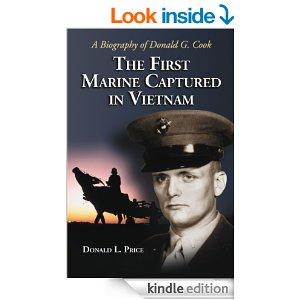Faith, Leadership, and Heroism in the Jungle
Colonel Don Price has written an excellent account of some little known heroic events of the Vietnam War. "The First Marine Captured in Vietnam-The Biography of Donald G. Cook," is first what the title states and much, much more. Price blends big picture history with the details of Cook’s life from his birth until he was captured in Vietnam. This was both a labor of love and duty for Colonel Price who is justifiably proud of his service with the Marine Corps and who remembers that Donald Cook followed him into the same Vietnamese Marine Corps battalion that he had served with the year before Cook was captured.Besides Captain Cook, you will meet Harold Bennett, a hard-charging Special Forces sergeant who was kicked out of his SF unit for punching out an officer and was captured while advising a Vietnamese Ranger company. Captured with Sergeant Bennett is PFC Charles Crafts, a draftee who carries Bennett's radio and who will, at great personal risk, carry hidden letters to the families of his fellow captives when he is released for propaganda purposes.In what could only be charitably described as improbable, is the true story of Donald Dawson, a civilian who left his family in California and came to Vietnam to search for his brother, an Army pilot shot down and missing. Captured in War Zone D with his pretty Eurasian interpreter, he joins the other POWs in their jungle camp.Four SF troopers, one of whom was SFC Isaac Camacho, on his second tour in Vietnam and playing a cat and mouse game with one of his captors, a VC in the camp who had been with him on his first tour at a CIDG camp where Camacho had taught him how to use a mortar. His captor had defected to the VC and now was trying to determine if Camacho was with him then. Camacho devised a kind of spy tradecraft to communicate with Cook and passed at least thirty messages back and forth using recognition signals and dead-drops. Camacho supported Cook’s leadership in the camp and also divulged his plan for an escape which Cook totally supported.The story how Captain Cook resisted interrogation and the brain washing attempts is a perfect illustration of how to apply the Code of Conduct to near impossible situations. Providing a sterling example to the rest of the POWs, he established his leadership among them far better than any words could. In doing so he even won the respect of his captors. Cook was a man of faith and when threatened with execution told the man holding a pistol to his head that, “Only God can decide when I die.”After several of the prisoners are executed in retaliation for the execution of VC by the South Vietnamese government and another dies of malnutrition and disease in the camp, Cook meets another American civilian, Douglas Ramsey, a captured USAID worker suspected of being a CIA officer. They became close companions.After Camacho escapes the rest of the POWs are forced to move. Two of the prisoners, both SF troopers are released for propaganda purposes and both give accounts of Cook's resistance, leadership, and adherence to the Code of Conduct.Another POW joined them in the person of Sergeant Norman Womack, the lone survivor of a 25th Infantry Division ambush patrol. Womack was another tough nut and when the VC asked him how to stop the war, he suggested B-52 strikes on North Vietnam. Womack became close to Captain Cook and assisted him on another long march that took them to Bu Dop close to the Cambodian border. Shortly afterward, Craft and Womack were released and brought letters and accounts of Cook, Ramsey and the other POWs.Back in the states, Donald Cook's wife and children waited with uncertainty as the years past. Three Commandants of the Marine Corps insured that the Cook family was taken care of during this long ordeal. Cook's only letter had reached her and the other POWs had assured her that he was alive. In 1970 the VC released a list of POWs who had died in confinement and Cook's name was on it. Still hopeful, Mrs. Cook waited to see her husband released with the other POWs after the Paris Peace Accords were signed.The Marine Corps compiled all the accounts of Donald Cook's heroism in captivity and Cook was awarded the Medal of Honor. His children inventoried his footlockers and in a briefcase found a letter two them written by their father just before he went to Vietnam.Donald Cook's essence is contained in that letter which is quoted in its entirety. I was overwhelmed by this account of an unknown American hero who’s story does much to legitimize our efforts to bring freedom to South Vietnam. There were many battles fought on that bloody ground but Donald Cook and his companions upheld the honor of their country as much as any of the other men whose names are recognized by their country. This book should be required reading for any service member who aspires to leadership in the armed forces.Gregory H. MurryMSG, U.S. Army (Ret)



